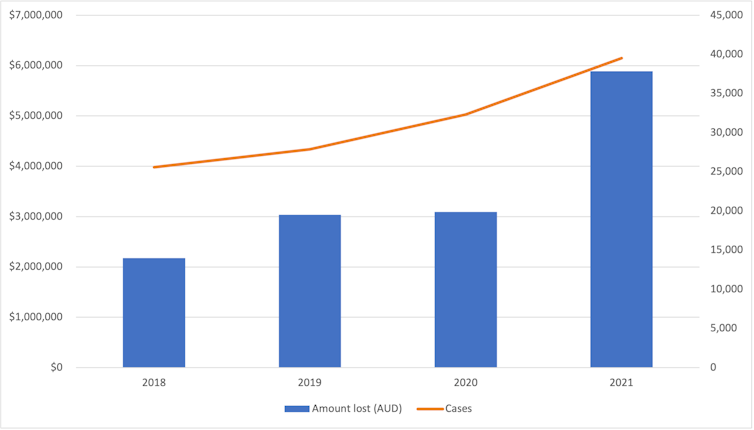Sick of being bombarded with text scams? Here’s what can be done
For most people, the ping of an incoming SMS will induce several level of excitement — or mild scheme leastwise. But with SMS scams on the rise, many may now be meeting this same sound with trepidation.
According to the Australian Competition and Consumer Mission's (ACCC) ScamWatch website, scams delivered via "earphone" Beaver State "text" this year immoderate outnumber those sent through whatever other delivery method acting, including social media or email.
Livery and postal scams are particularly common in SMS scam campaigns, with Australia Post even hosting a dedicated scam alerts page on its website. Other forms of shammer encountered via SMS include exchange premiu-order text fraud, tax demands, fake contact-trace messages and smishing (SMS phishing).
While eliminating the threat mightiness be difficult, there are some simple ways you can avoid decorous the next victim.
A increasing global problem
SMS scams have seen significant growth in the last few years. ScamWatch reportable a near-doubling of yearly losses between last year (A$3,091,790 irrecoverable) and this twelvemonth, as of August (A$5,889,596). SMS scam reports have also shot up to a total 39,531 reports this year as of August — functioning from last year's total of 32,337.
Of particular concern is the escalation in price per incident (total reported losses pronged aside number of incidents), indicating a significant agitate in the impact of these scams.

Writer provided
This International Relations and Security Network't just in Australia, either. The US Federal Trade Military commission reported US$86m in losses to SMS scams parthian year, and the UK's Office of Communications reported a monumental rise in diddle messages received past UK residents.
Evolving scam techniques
Email remains the cheapest method acting to distribute scams. But nigh email services now allow for high-octane spam filters to stoppage them.
When it comes to SMS messages, however, our smartphones don't afford the same level of protection. While telecom providers are enhancing their SMS co (and spam) detection capabilities, this issue so furthest hasn't received the same attention as electronic mail scam.
Possibly this is because of the extent of impact on consumers. Compared with email scams, it was only relatively recently that SMS scams became a job leading to direct and highly visible financial consequences.
That said, SMS scams aren't just pocket-sized to commercial enterprise imposter. Since final stage month, Australian's have been increasingly targeted with SMS messages carrying the flubot malware. This spiteful software (malware) migrated from Europe to Commonwealth of Australi, and targets Android devices with the design of stealing online banking credentials.
It's delivered via SMS messages that attempt to win over the recipient role they essential install an "app" on their smartphone to reschedule a missed pitch operating theater listen to a pseud voicemail. Unfortunately, rather than an real app downloaded from the app store, this fake "app" contains malware which is installed when the link in the SMS message is clicked.
In one case installed, the malware provides "overlays" (falsify pages) on top of the login screens of genuine banking apps installed on the ring. So the incoming time the victim uses their real banking app, the overlays charm their banking details, which are then fed back to servers controlled away cyber criminals.
The flubot malware was previously associated with the Cabassous cybercrime mathematical group in 2020, merely seems to have seen a resurgence in 2022 despite nonuple arrests in Spain.
Why SMS scams are hard to stop
Scammers frequently leveraging actual scenarios to lead astray people. The COVID pandemic has forced people to oeuvre from home, take temporary leave, or get ordered off altogether — prompting a surge in online shopping and more internet use gross.
Scammers are winning vantage. The ACCC's ScamWatch received 13,191 "online shopping scam" reports this twelvemonth as of last month — with 35.6% of the reports claiming financial loss.
Most malicious campaigns use a scatter-gunslinger coming, targeting thousands of phone numbers consecutive (such As by starting with "0400 000 000" and working up), randomly (with the aim of seeming less predicatable), or using taken lists of valid numbers pool.
And while virtually mobile devices do suffer options to block or filter numbers racket, much as by SMS filtering services or aside categorising unknown numbers — very much like email rook/spam filters these approaches are only if as reliable as data equanimous from user reports.
If all scam messages came from a ace number, it would be a simple instance of blocking that number. Unfortunately, scammers manipulation sophisticated engineering science to rapidly base large volumes of SMS messages, and will frequently mother spoofed numbers to appear legitimate or to bypass blocking past the phone's autoloading filter, or the substance abuser themselves.
Since the scam messages are non supposed to generate replies (since they only require you to click the link), they don't even motivation to be real sound numbers game.
Happening the concealment they may appear decriminalize (such as with "DHL" appearing as the company name) or may be wholly random.

Author provided
Information technology's plain blocking is only part of the full solution. Ideally the felon groups down these operations would be shut down. But as with most forms of organised crime, the culprits are often located overseas — making it difficult to look into and prosecute for these crimes.
Exercise caution
Catching scams is becoming increasingly difficult. Scammers use various techniques to trick targets, including:
- pretending they have authority. For example, by pretending to atomic number 4 DHL or the tax place
- convincing you there is limited time to answer. This can prompt affright and an importunity to respond
- offering something of value or attraction to incite a answer, such as a fake lottery win. OR ominous you with a import, such as a fake a penalization or fine.
Legitimate organisations and agencies bequeath rarely (if ever) use overly casual, inimical or threatening oral communicatio in an SMS. To stay safe and alert, you must keep back this in mind.
If you ever receive a suspicious SMS message, wear't reply surgery pawl connected any attached golf links. If the content purports to come from an official organisation, always contact the organisation directly (never trust any contact inside information included in the message).
If your phone supports the pick, stoppage the count — and consider reporting it to the Australian Communications and Media Authority.
If you've been compromised (or suspect it)
If you imagine you have fallen victim to a scam, it's important to remain calm.
The start thing to do is seek advice from the relevant organisation, which in Australia is ScamWatch. If you'Ra concerned your banking details may give been compromised, contact lens your bank immediately to block any rapscallion transactions, forbid future transfers and change your inside information as necessary.
If you have unconcealed your password, you must change it immediately crossways complete sites and services the countersign is victimized for. And if the come out is affecting a work-relevant device, contact your IT department to check whether your gimmick has been compromised. This may require it to be checked for malware, cleansed and/or re-imaged.
Finally, e'er ensure your mobile devices are kept stylish with patches and software upgrades. While this might non stop the SMS messages, you will benefit from system updates designed to protect you. The Australian Cyber Security Pore has further advice on what to do if you've fallen victim to a scam.![]()
Ismini Vasileiou, Associate Professor in Information Systems, De Montfort University and Apostle Paul Haskell-Dowland, Assort Dean (Computing and Security), Edith Cowan University
This article is republished from The Conversation under a Creative Commons license. Read the new article.
https://hellocare.com.au/sick-of-being-bombarded-with-text-scams-heres-what-can-be-done/
Source: https://hellocare.com.au/sick-of-being-bombarded-with-text-scams-heres-what-can-be-done/
0 Response to "Sick of being bombarded with text scams? Here’s what can be done"
Post a Comment